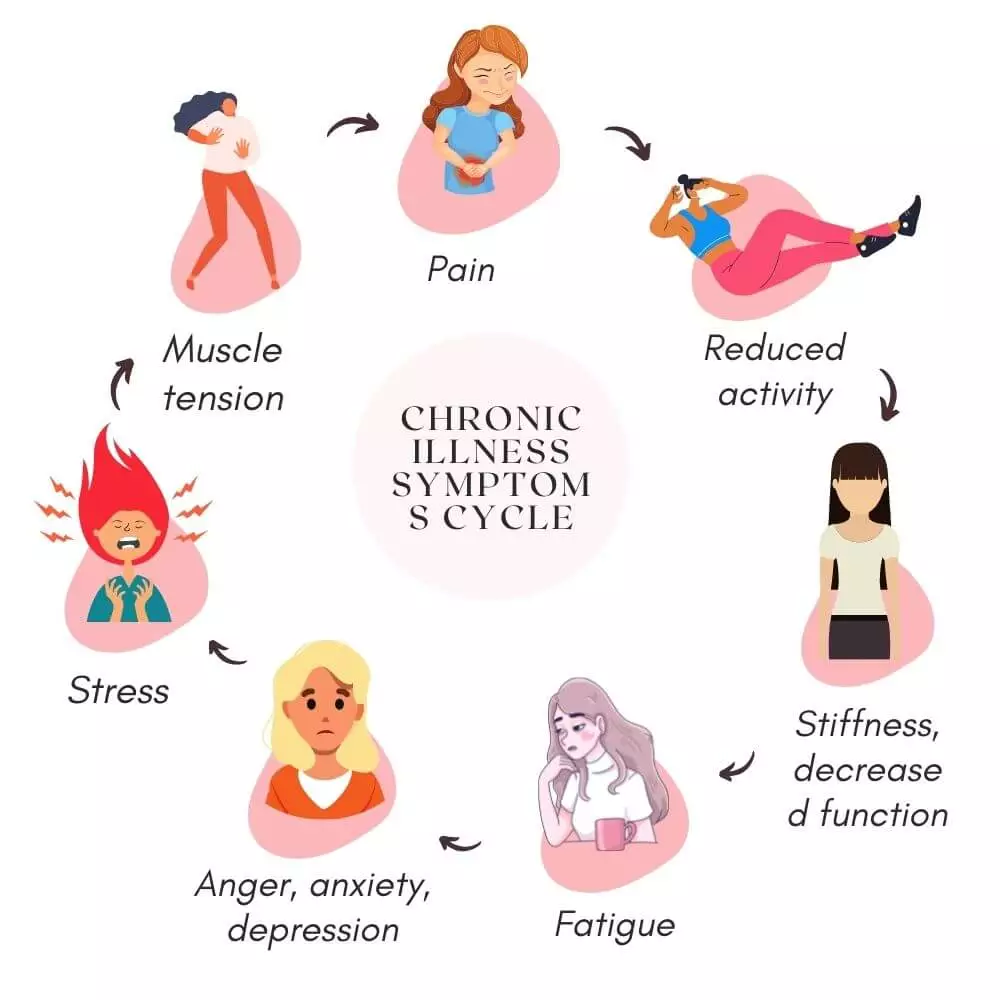When someone you love is sick. Chronic illness and relationship.
When someone you love is sick…
When someone you love is sick, your relationship is impacted by challenges that none of the healthy couples will ever experience. I never imagined I would be in the position I’m in today, but I am humbled to be in it because it made me a better man.
My wife suffers from multimorbidity, meaning, she has more than one condition. M suffers from two chronic illnesses – stage IV deep infiltrating endometriosis and fibromyalgia disorder. Aside from that, she suffers from general anxiety, Obsessive-Compulsive Disorder, depression, and severe anemia, all of which are the outcome of both chronic conditions.
In the beginning, my wife and I were absolutely heartbroken and devastated after her diagnosis of endometriosis, and additionally, she was also diagnosed with fibromyalgia a year after.
But despite the hardship, these illnesses caused us, my personal experience in supporting my ill wife for a decade taught me wonderful things.
So, what can you do when someone you love is sick? Here’s the short answer:
- Communication is a must!
- Do what needs to be done, not what you think you should do.
- If your loved one wants to talk to you about death, listen.
- Don’t hide the fact that you’re unhappy.
- Understand that “cheering up” a sick person often backfires.
- Realize that what you cook may not be helpful…
- Be prepared for change. Except for the unexpected.
- Take all the medical guidelines with a grain of salt.
- Talk to your loved one about what’s happening.
- Discuss the practical things…
- Find someone for you to talk to.
- Take care of yourself.
- Don’t be afraid to ask for help!
- Let them cry, let them be scared…
- Be strong in front of them.
- Always believe in them!
To begin with…
I listed above in a nutshell 16 things you can do when someone you love is sick. These are one of the most important things I think of daily in order to support my wife.
Chronic illness is unpredictable, its flare-ups are unpredictable too, but living with two chronic conditions is more unpredictable than you could ever imagine. At least at the beginning of your journey.
With time, I have learned what triggers my wife’s symptoms of endometriosis and fibromyalgia.
What works for my wife may not work for your partner, but since I began to write my blog, I have spoken with hundreds of women who suffer from endometriosis alone, and most of their symptoms are triggered by similar things.
But the chronic illness symptoms cycle I am about to show you applies to both, fibromyalgia and endometriosis. They are triggered by the same things. To best illustrate it, I designed a chronic illness symptoms infographic. Take s look below…

When someone you love is sick…
As you can see on the chronic illness symptoms infographic, the cycle doesn’t end, there’s always something going on. One thing impacts another.
Pain causes your partner to feel immobile to some extent, which reduces activity. This makes your loved one feel stiff, less flexible, decreases your partner’s strength and function. All of this causes fatigue, which can become chronic.
The fear and anxiety over the unknown, the loss of activity, and overall function often lead to depression, anger, sometimes suicidal thoughts.
Such amount of stress isn’t only psychological, it affects the body causing muscle tension, and therefore, pain. The chronic illness symptoms cycle continues.
So what can you do to break this cycle?
The answer is in the very sentence – break it! You need to help your partner break one of the components.
Breaking the chronic illness symptoms cycle can be tricky, but it can be done. I found that stress is the biggest trigger of all the symptoms and pain. I listed below 16 helpful tips on when someone you love is sick…
When someone you love is sick…
Communication is a must!
Every couple has issues, but when someone you love is sick, the relationship has completely different challenges, especially when you’re married.
When one spouse is chronically ill, the divorce rate is as high as 75 percent. Married women diagnosed with a chronic illness are 6 times more likely to be divorced.
Statistics show that 75% of marriages affected by chronic illness are more likely to end in divorce when the woman is chronically ill. This means that men are more likely to walk away.
I stood by my wife despite her constant battles with endometriosis and fibromyalgia. The impact on her mental wellbeing was immense.
M asked me on a few occasions to divorce her for my sake, but I never did. I’m happily married. My wife has chronic conditions, so what..? My wife tried to commit suicide on a few occasions, so what..?
How did we manage to survive this?
Communication, communication, and more communication. There is no magic solution to it. It’s simply an honest and open conversation about any issues that arise.
Do what needs to be done.
Do what needs to be done, not what you think you should do, there’s a difference. Just think about what I said. At the lowest points of our marriage, when I was to lose my wife to suicide or divorce, I did what needed to be done.
How so?
If I did what the majority does (70% of people divorce), I would walk away, or let my wife die.
On one hand, you think I’d be free, it’s what my wife always wanted, right?
Yes, she tried to commit suicide because she feels like a burden to me and wanted me to be happy without her illnesses, and yes, she wanted me to divorce her because of my sake of being with a healthy woman.
I stood by her because I would never forgive myself if I didn’t. The guilt would haunt me for life. I don’t know guys who leave their wives to live with themselves. In my eyes, they aren’t men. They are weak.
Before you judge me, think about it… if a woman who’s chronically ill suffers daily and still tries to live a fairly normal life, healthy men should have absolutely nothing to moan about. At the end of the day, when you wake up and lift your head of the pillow, you have everything you need.
You have health, you’re so lucky to have it. Do appreciate it. Many people only begin to live and appreciate little things when something terrible happens. It usually ends with disappointments and regret.
Not because I didn’t want to. Because he asked me to leave. Because he wanted me to get enough rest so that he could count on me coming back.
So that I’d be safe to drive and bring him outside food. So that he could trust me to research the doctor’s recommendations and help him communicate his choices.
Because he could tell how scared I was, and my fear was making him feel anxious.
Many of us have dreams of being the valiant caregiver who selflessly never leaves the hospital bedside for a moment. If that’s how you think it will go down, I want to tell you something: that may not be what your loved one needs from you.
Leaving their side can feel awful. You may feel crushing guilt from not being able to do enough. Friends or family may question your commitment. And when things are really bad, there’s the gnawing fear that you’ll miss out on the moments when you were truly needed.
But if going home to sleep, taking a walk, or spending an hour crying on your friend’s shoulder is going to make the difference between you being a guilt-laden, anxious wreck and your best self, that is what your loved one needs from you. Serious illness is a marathon. Don’t mistake it for a sprint.
So, take care of yourself, but do what needs to be done, take care of your partner.
Your partner’s dark thoughts…
If your loved one wants to talk to you about death, listen. Do take this seriously and listen to what your partner has to say. I mean, honestly listen.
My wife has a rare type of endometriosis. It made her feel less of a woman because we don’t have kids, and because of the struggles with painful sexual intercourse that endometriosis causes.
She’ll never be a biological mother, she doesn’t feel as womanly as she wished, she’s in physical and emotional pain. That leads many women to suicidal thoughts. If she has no one to talk to about her feelings, she’ll likely commit to it.
I know that she feels like a burden to me, but I told her never to hold back. To say everything she feels, any time, any place. I’m always there to listen.
Words and thoughts can harm. Sometimes even more than physical acts. Pay attention. Physical wounds heal faster than psychological ones. This is why you have to listen to what your partner says. Never interrupt them, just listen.
Endometriosis steals the lives of women. If I didn’t pay attention to what my wife used to say, I would miss all the clues she left me, and lose her to this insidious, unforgiving condition.
Don’t hide the fact that you’re unhappy.
I did. She still sensed it. No matter how much I tried to hide my feelings, sometimes I got up on a bad foot. My wife told me many times that my face looked grumpy, without me even realizing that I was.
I never said I was unhappy, I was always happy, that’s the nature of optimistic people like myself.
But nevertheless, she noticed that I wasn’t as happy as I usually am, I wasn’t as chatty, silly, and loud either. I used to hide what I felt thinking that she had enough on her plate already, and I didn’t want to add to her worries.
I wasn’t wrong, she cared what I was thinking, but feeling suicidal at the time, she needed to remove all the stressful triggers in order to heal.
Later on, M explained to me that she sensed that something wasn’t right, and said, that she would rather know what I feel so we could sort things out together. After all, we travel through this chronic journey together.
Like I mentioned at the beginning, the most important part of a successful relationship is communication, but it’s also trust. By not speaking up, I avoided both.

Cheering up a sick person often backfires.
When someone you love is sick, you need to understand that “cheering up” backfires. Your loved one is ill, be sensitive. Remember that chronic illnesses such as endometriosis and fibromyalgia don’t have a cure.
Your partner needs to manage symptoms in a holistic way to break the chronic illness symptoms cycle.
Let me give you my own examples… I am an optimist. Additionally, I’m an extremely fit, healthy man. But I caught myself on many occasions trying to use my optimistic attitude to cheer my wife up.
Maybe not at the beginning, but later it always backfired, and I got caught up annoying my wife rather than helping her.
Because no amount of cheering up will change her situation. Endometriosis flare-ups come on go, the same goes for fibromyalgia. My positive attitude will not erase her situation. Acceptance is a better option.
You cook to help, but…
Realize that what you cook may not be helpful for your chronically ill loved one. Your partner most probably needs a low FodMap diet and has to exclude a lot of goodies, including:
- dairy
- sugar
- alcohol
- unhealthy fats
- a lot of caffeine
FodMap’s are found in a wide range of such foods, and they vary in amounts. Some foods contain just one type, other foods contain several.
Food is one of the most common triggers of endometriosis and fibromyalgia flare-ups. By restricting certain foods your partner can dramatically improve the symptoms. Please have it in mind.
So, by all means, cook for your partner, but learn first about this low FodMap diet because you’re going to kill two birds with one stone, by taking away her worries with cooking and shopping.
Ideally, you’d want to create a low FodMap grocery list.
Except the unexpected!
Be prepared for change. Your life will never be the same again. However, my friend, we signed up for it, for better or worse, and we need to do what’s best for our partner, without neglecting ourselves!
Your plans may often change, depending on your partner’s circumstances because flare-ups aren’t as predictable as we would like them to be.
People may feel like you disappoint them all the time, but remember that they are those kinds of people who don’t understand chronic illness. By remembering that true friends will stick by your side or at the very least try to learn about your partner’s condition.
When having pain episodes, your partner may be crying into a pillow even a few times a day. But remember that a restricted diet and trying to limit your loved one’s physical activity won’t spark new pain episodes.
Our partners should follow their intuition (gut). The gut is our second brain that is responsible for how our body reacts.
Talk to your loved one.
Talk to your loved one about what’s happening. When someone you love is sick, regardless of the kind of chronic illness, you need to talk to your partner because it is going to help both of you cope better.
Discussing endometriosis allows you to plan things to some extent. You may never be able to plan your future entirely, but it helps to be a little organized and prepared.
Whenever your partner has something on her mind, ask how she feels, discuss what your partner is going through.
The conversation is what helps you both go through difficult situations. Neither of you feels alone, it creates deeper connection, understanding, trust, and intimacy.
Talk to your loved one about what’s happening. Discuss the practical things.

Find someone to talk to!
Aside from discussing things with your partner, find someone to talk to for your own sake. You need to take care of yourself and conversation with someone outside your relationship is the best thing you can do.
For me, it’s my mom and my mother-in-law. But I also discussed things with my employer.
Not every employer is very understanding, but as a caregiver for disabled young adults, my HR understands my struggles and gave me another way of reviewing my frustrations and thoughts.
They offered me free counseling.
I understand that it might not be the case for everyone, but the workplace should provide access to such help, occupational health the least.
Talking things through is the best form of taking care of yourself. It’s a form of self-care. Taking care of yourself allows you to take better care of your partner.
Remember, if you don’t take care of yourself first, you won’t be any help to her. So, don’t be afraid to ask for help!
Let them cry…
Let your partner cry, let her be scared. It is a way of coping. Endometriosis is a terrifying illness.
Health is everything! Without health you have nothing.
You will definitely struggle yourself at times, but I’ve learned that best is to do it away from your partner. Be strong in front of her.
Allow your partner to cry, show fear, but listen and be there for them. Don’t make them feel they have to bottle up their feelings, it doesn’t always end well.
When someone you love is sick, you may not be able to understand what thoughts run through their head but you can be there and reassure them.
That’s about it.
Belive them!
When someone you love is sick, the last thing they need is for their loved one not to believe what they are going through.
Doctors often don’t take female symptoms seriously often blaming them on anxiety and depression. Ironically, these mental health problems are the outcome of symptoms they experience, not the other way round.
It can be very frustrating. It makes their pain and flare-ups worse because anxiety over not being believed or understood makes the symptoms worse.
Trust your partner, don’t ignore their pain. It may be invisible but it’s real. When someone you love is sick, it doesn’t always show. There is no test for trust, but you must trust your loved one. She wouldn’t invent her symptoms. Why on earth would she do that?
Nobody can see your toothache, does it mean it isn’t there? Believe your partner and always discuss things through.
Grand gestures are lovely, but small consistent offerings are more valuable in the end. Showing your partner that you believe her makes your loved one feel cared for. It makes her feel wanted and less of a burden.
If you’re struggling with your partner’s illness, contact the helpline or mental health professional. Never afraid to ask for help. Sometimes your partner may not feel up for it, but do encourage and motivate her.
To wrap things up, I hope you found this post helpful, and I would like nothing more than to wish you both a happy relationship.
Ciao!


About Me
Hi, I’m Lucjan! The reason why I decided to create this blog was my beautiful wife, who experienced a lot of pain in life, but also the lack of information about endometriosis and fibromyalgia for men…
